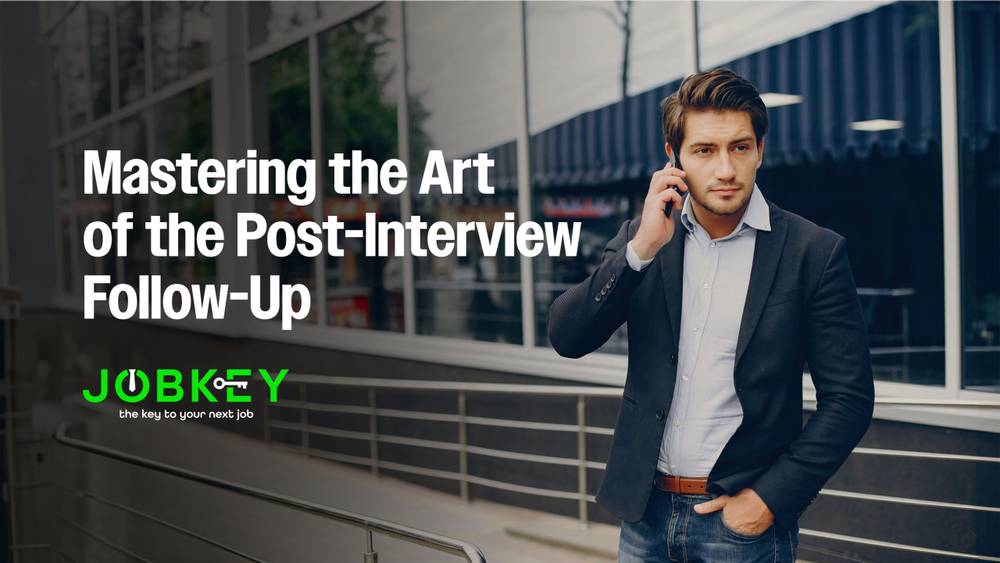
In the competitive world of job hunting, standing out among a sea of applicants is crucial. One powerful yet often overlooked strategy is the post-interview follow-up. Knowing how and when to follow up after an interview can significantly boost your chances of landing the job. Here’s a guide to understanding the importance of follow-ups and mastering this art to leave a lasting impression on potential employers.
Why Follow-Up Matters
Demonstrates Professionalism: A timely and well-crafted follow-up shows that you are serious about the position and respectful of the interviewer’s time and effort.
Keeps You Top of Mind: With many candidates vying for the same role, a follow-up can help keep you on the interviewer’s radar, reminding them of your interest and qualifications.
Shows Appreciation: Expressing gratitude for the opportunity to interview can foster goodwill and demonstrate your positive attitude.
Provides an Opportunity to Reinforce Interest: A follow-up allows you to reiterate your enthusiasm for the position and the company, highlighting your eagerness to contribute.
Timing is Everything
Send a Thank-You Email Within 24 Hours: Ideally, your first follow-up should be a thank-you email sent within 24 hours of your interview. This promptness shows your enthusiasm and consideration.
Follow Up Again If No Response: If you haven’t heard back within the timeframe given by the interviewer (or within a week if no timeframe was provided), it’s appropriate to send a polite follow-up email to inquire about the status of your application.
Crafting the Perfect Follow-Up Email
Express Gratitude: Start your email by thanking the interviewer for their time and the opportunity to discuss your potential role at the company.
Reiterate Your Interest: Clearly state your continued enthusiasm for the position and the reasons why you are excited about the opportunity.
Highlight Key Points: Briefly remind the interviewer of your key qualifications and how they align with the job requirements.
Address Any Unresolved Points: If there were any questions you couldn’t fully answer during the interview or additional information you wanted to provide, this is a good time to address them.
Be Concise and Professional: Keep your email concise, well-structured, and free from errors. Maintain a professional tone throughout.

Sample Follow-Up Email
Subject: Thank You – [Your Name]
Dear [Interviewer’s Name],
I hope this message finds you well. I wanted to extend my heartfelt thanks for the opportunity to interview for the [Position] role at [Company] on [Interview Date]. I truly enjoyed our conversation and learning more about the exciting work being done at [Company].
I remain very enthusiastic about the prospect of joining your team. The discussion about [specific topic discussed during the interview] particularly reinforced my belief that my skills and experiences in [relevant field or skill] would be a valuable addition to your team. I am confident that my background in [briefly mention key qualifications] would allow me to contribute effectively to [Company]’s ongoing success.
If there is any additional information I can provide or if you have any further questions, please do not hesitate to reach out. Thank you once again for your time and consideration. I look forward to the possibility of working together.
Best regards,
[Your Full Name]
[Your Phone Number]
[Your LinkedIn Profile or Professional Website, if applicable]
When to Stop Following Up
Respect Boundaries: While persistence is important, it’s equally crucial to respect the boundaries and the interviewer’s time. If you haven’t received a response after a couple of follow-ups over a few weeks, it may be best to move on.
Stay Positive: Regardless of the outcome, maintain a positive and professional demeanor. Each interview is a learning experience and an opportunity to refine your approach.
Conclusion
Mastering the art of the post-interview follow-up can set you apart from other candidates and significantly enhance your chances of landing the job. By expressing gratitude, reiterating your interest, and maintaining a professional tone, you can leave a lasting impression that highlights your dedication and enthusiasm. Remember, the power of persistence, when done correctly, can be a key factor in your job search success.





